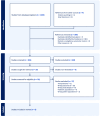The Effect of Long-Term Azithromycin on Objective and Subjective Cough in Chronic Respiratory Disease: A Systematic Review and Meta-analysis of Randomised Controlled Trials and Noncomparative Studies
- PMID: 38990397
- PMCID: PMC11427617
- DOI: 10.1007/s00408-024-00729-8
The Effect of Long-Term Azithromycin on Objective and Subjective Cough in Chronic Respiratory Disease: A Systematic Review and Meta-analysis of Randomised Controlled Trials and Noncomparative Studies
Abstract
Introduction: Azithromycin is an effective treatment for various respiratory conditions but its effect on cough is poorly understood. We synthesised data from randomised controlled trials (RCTs) and noncomparative studies (NCT) examining its effect on objective and subjective cough.
Methods: After prospective registration on PROSPERO, we searched MEDLINE, EMBASE, and CENTRAL for both RCTs and NCT trials examining the effect azithromycin on cough in respiratory disease.
Results: We identified 1240 studies of which 6 (4 RCTs and 2 NCT studies) were included in the meta-analysis, with a total of 275 patients. Azithromycin was associated with significant improvement in Leicester Cough Questionnaire scores at follow-up when compared to baseline scores (SMD = 0.62 [95% CI 0.12 to 1.12], p = 0.01). However, when only RCTs were synthesised, no significant effect was observed (SMD = 0.12 [95% CI - 0.36 to 0.60], p = 0.62). There was no significant reduction in cough severity VAS score (SMD = - 0.39 [95% CI - 0.92 to 0.14], p = 0.15). There was no significant reduction in objective cough count (SMD = - 0.41 [95% CI - 1.04 to 0.32], p = 0.09).
Conclusion: Azithromycin therapy improves cough-related quality of life in various chronic respiratory diseases; however, there was no significant effect on cough outcomes when only data from RCTs were synthesised. We believe that to accurately identify which patients whose cough would benefit from azithromycin a large-scale clinical trial of patients with a broad spectrum of respiratory diseases, with sufficiently severe cough, should be undertaken with subgroup analysis of individual disease areas.
Keywords: Azithromycin; Chronic respiratory disease; Cough.
© 2024. The Author(s).
Conflict of interest statement
The authors declare no competing interests.
Figures






References
-
- Statistics OFN (2023) Monthly mortality analysis, England and Wales: February 2023. https://www.ons.gov.uk/peoplepopulationandcommunity/birthsdeathsandmarri...
-
- Çolak Y, Afzal S, Lange P, Laursen LC, Nordestgaard BG, Dahl M (2019) Role and impact of chronic cough in individuals with asthma from the general population. J Allergy Clin Immunol 7(6):1783–1792 - PubMed
-
- Burgel P-R, Nesme-Meyer P, Chanez P, Caillaud D, Carré P, Perez T et al (2009) Cough and sputum production are associated with frequent exacerbations and hospitalizations in COPD subjects. Chest 135(4):975–982 - PubMed
Publication types
MeSH terms
Substances
LinkOut - more resources
Full Text Sources
Medical

